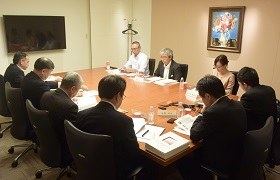Archived content
NOTE: this is an archived page and the content is likely to be out of date.
FY 2016 Stakeholder Dialogue Session 2
Dialogue Session 2 : SDGs and Social Issues
Experts:
| Mr. Hiroshi Sato, | Chief Senior Researcher, Institute of Developing Economies, JETRO | |
| Mr. Eiichi Sadamatsu, | Managing Director, Secretary General, Japan NGO Center for
International Cooperation |
|
| Ms. Yukie Sasaki, | Corporate Engineering Lead, Monsanto Japan Limited |
Fujitsu:
| Mr. Mitsuya Yasui, | Corporate Executive Officer, EVP, Head of Legal, Compliance & IP Unit
In charge of CSR Division, Risk Management and Security Export Control |
|
| Mr. Takeshi Nakajima, | Corporate Executive Officer, SVP,
Head of Government & Public Utilities Business Unit |
|
| Mr. Yasuhiro Kano, | Head of Unit, Marketing Unit | |
| Mr. Arimichi Kunisawa, | Head of Unit, Technical Computing Solution Unit | |
| Mr. Akihiro Yoshida, | Director, CSR Promotion Office
Head of Unit, Corporate Affairs & Risk Management Unit |
* Positions and titles of participants are as at the time the dialogue was held.
 Mr. H Sato Mr. H SatoChief Senior Researcher, Institute of Developing Economies, JETRO |
 Mr. E Sadamatsu Mr. E SadamatsuManaging Director, Secretary General, Japan NGO Center for International Cooperation |
 Ms. Y Sasaki Ms. Y SasakiCorporate Engineering Lead, Monsanto Japan Limited |
Sadamatsu: The Sustainable Development Goals (SDGs)*1, adopted by the UN in September 2015, require all countries, including developed nations, to pursue as a self-owned initiative the creation of a new lifestyle to replace the mass-production/mass-consumption model. In particular, there are high expectations for the private sector - which has the ability to drive major social changes - to resolve social issues while also developing products and services that are compatible with the global environment. Many global companies have already begun working on this.
Sato: The connection between business and the development of developing nations is growing increasingly closer and we are hearing examples of companies that are solving social issues locally while also earning profits through BoP business*2. On the other hand, there is a risk of extending right down to the end of the global value chain as businesses expand in developing nations. Although international NGOs sometimes point out this risk and criticize companies, working in collaboration with NGOs can be regarded as a way of preventing such risks. This is also a necessary step on the path to influencing global public opinion and it is hoped that Fujitsu will play a role in this area.
Sasaki: Monsanto aims to resolve social issues over the long term through the company's business. For example, our corporation has already made commitments that include numerical targets to tackle the task of improving the lives of agricultural producers and ensuring stable global food supply based on the long-term vision of sustainable agriculture. While a long-term vision is essential to boost business, it is important to fast track progress toward goals. We must respond to market and customer demands with a sense of urgency.
Nakajima: Fujitsu's technologies are regarded as very useful for assisting with various areas of development in Asia and around the globe. However, many of our prototypes, irrespective of scale or volume do not go on to become innovations. Our company also tends to target only the top tier of the pyramid, and therefore does not have a comprehensive view of the entire market. To perform broad-ranging activities it is necessary to create a value chain that includes people outside the company. However, the situation we find ourselves in at present is one of not being able to skillfully design business models that resolve social issues while also supporting a sustainable business.
Kunisawa: Globally, we are working on science- and technology-related businesses, such as meteorology and space, in which supercomputers are pivotal. In some cases we have helped customers resolve social issues using the scientific and technological attributes that they possess. However, most are in the proof-of-concept stage and there are many hurdles in terms of business and cost recovery. Under Japan's 5th Science and Technology Basic Plan, the research organizations among our clients are calling for a switch to focus on resolving social issues. As this requires cross-departmental decision-making within Fujitsu, another issue we face is to adopt a company-wide perspective rather than dealing with the multiple views of disparate business units. The SDGs were originally focused primarily on environmental aspects, but I feel that we must now take an approach that encompasses even broader spheres of activity.
Sato: Many BoP businesses don't get past the proof-of-concept stage. The reason they don't get up and running or develop into commercial businesses is because the basis for evaluating business feasibility at the management level is heavily weighted toward revenue and return. When considered on a global scale, while growth is necessary, what is even more important is equitable distribution. If you view the role of ICT in a more intelligent distribution paradigm from a clear, simple perspective, then this surely creates a different basis for evaluation and I have hopes for Fujitsu on this point as well. Most examples of taking existing solutions and implementing them locally "as is" have failed. It is essential that we adopt a process in which engineers can directly assess for themselves what the actual challenges are in the field and then determine whether or not a company's solutions can be used.
Sadamatsu: A key principle of the SDGs is "Leaving no one behind". This also applies in Japan where planning must be considered from the perspective of the types of innovation needed to reach people close to home who are being left behind. Also, accurate data is essential to achieve the SDGs. I am hopeful of seeing Fujitsu technologies with such features as intuitive data input and aggregation systems that can be used anywhere, to ensure that small groups such as ethnic minorities are not omitted from any counting or analysis.
Kano: From a marketing perspective, we must thoughtfully consider the messages we communicate globally. We emphasize human centric innovation and build this into our messages. However, I think we need to also conduct internal discussions with key people in our company to focus on how many people's lives we can improve through ICT, and then lobby to concentrate on specific areas, rather than taking an omnidirectional approach.
Yoshida: Given that visions and goals need to be tied to actions, I believe we need to spell out what we are trying to achieve together with the actions that we will take. Also, as Fujitsu is currently engaged in a broad range of businesses for many customers, while it is difficult to identify specific areas it would be good to adopt standards such as the SDGs as a starting point.
Sasaki: Monsanto is an agricultural company that is involved in the SDGs through its business activities, and ICT can be applied when tackling all of the SDGs. Therefore, it is important to clearly define your vision and the areas in which you want to contribute, as well as to take a bird's-eye view globally to find a position from which you can demonstrate your strengths. Our company is deploying a strategy involving universities and research institutions to shape public opinion so that our goals are recognized as solving social issues.
Yasui: It's also important that younger employees in the company are equipped with the appropriate skills to play an active role in the fields encompassed by the different SDGs. Our company's senior managers concentrate on governance and our external directors, with their diverse professional backgrounds, take a great deal of interest in CSR. I hope that we can foster debate with them and send out a strong message from even the highest levels of the company.
Sato: When tackling the SDGs, the key is considering how to incorporate the social issues of daily life and engage with young people who are digitally adept and have all kinds of good ideas. However, in large companies it can take a long time before younger employees with passionate beliefs have the chance to demonstrate their abilities in the business arena. In the meantime, it is crucial to continue communicating the company's stance on tackling the SDGs so that employee enthusiasm does not wane.
Sasaki: Sending out clear messages, including the kind of company you are aiming to create and accompanying numerical targets, is very effective in ensuring that employees have a shared mindset of "What it is that I am working toward".
Sadamatsu: I think that creating symbolic projects which clearly highlight a company's initiatives in such areas as the SDGs, as a starting point, is useful for pursuing CSR in terms of scaling up and differentiation from other companies.
[Summary of Session 2]
We have received many informative suggestions and tips for incorporating the SDGs into our business activities, including the importance of communicating the company's direction. We will aim to re-evaluate our business based on the view that the planet and the corporate world cannot survive if we continue on the same path, and we will apply this modified thinking to running the company.
Notes:
*1 Sustainable Development Goals (SDGs)
The Sustainable Development Goals are the 17 goals, with 169 targets, to be achieved by 2030, which have been set as a universal call to action to ensure the prosperity of both the world's people and the planet itself. United Nations member nations will strive from 2016 to 2030 to attain sustainable development by meeting these various goals on poverty and hunger, energy, climate change, and the creation of peaceful, prosperous societies.
*2 BoP (Bottom of the Pyramid) business
BoP business is sustainable business that provides useful products and services to the low-income demographic earning below US$3,000 per year. These people are found mainly in developing nations and comprise approximately 70% of the world's population. Providing goods and services to this market segment helps to raise the living standards of people in these nations while also contributing to ongoing corporate growth.
Scene from Session 2

